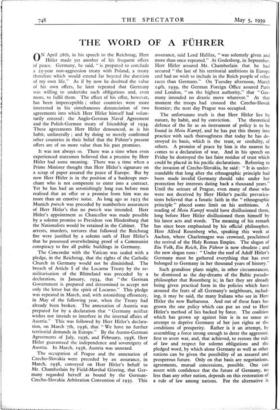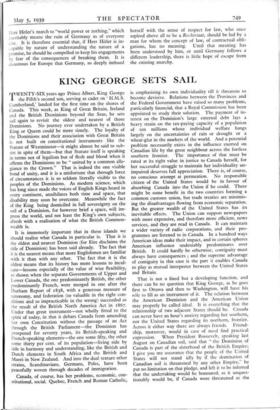THE WORD OF A FUHRER O N April 28th, in his
speech to the Reichstag, Herr Hitler made yet another of his frequent offers of peace. Germany, he said, " is prepared to conclude a 25-year non-aggression treaty with Poland, a treaty therefore which would extend far beyond the duration of my own life." As if by now he doubted the value of his own offers, he later repeated that Germany was willing to undertake such obligations and, even more, to fulfil them. The effect of his offer, however, has been imperceptible ; other countries were more interested in his simultaneous denunciation of two agreements into which Herr Hitler himself had volun- tarily entered : the Anglo-German Naval Agreement and the Polish-German treaty of friendship of 1934. These agreements Herr Hitler denounced, as is his habit, unilaterally ; and by doing so merely confirmed other countries in their belief that the Fiihrer's present offers are of no more value than his past promises.
It was not always so. There was a time when even experienced statesmen believed that a promise by Herr Hitler had some meaning. There was a time when a Prime Minister thought that Herr Hitler's signature on a scrap of paper assured the peace of Europe. But by now Herr Hitler is in the position of a bankrupt mer- chant who is not competent to enter into a contract. Yet he has had an astonishingly long run before men realised that an offer or a promise from him was no more than an emotive noise. As long ago as 1923 the Munich putsch was preceded by numberless assurances of Herr Hitler's that no putsch was intended. Herr Hitler's appointment as Chancellor was made possible by a solemn promise to President von Hindenburg that the Nationalists would be retained in the Cabinet. The arrests, murders, tortures that followed the Reichstag fire were justified by a solemn oath of Herr Hitler's that he possessed overwhelming proof of a Communist conspiracy to fire all public buildings in Germany.
The Concordat with the Vatican was sealed with a pledge, in the Reichstag, that the rights of the Catholic Church in Germany would not be diminished. The breach of Article I of the Locarno Treaty by the re- militarisation of the Rhineland was preceded by a declaration, in January, 1934, that " the German Government is prepared and determined to accept not only the letter but the spirit of Locamo." This pledge was repeated in March, and, with astonishing effrontery, in May of the following year, when the Treaty had already been broken. The annexation of Austria was prepared for by a declaration that " Germany neither wishes nor intends to interfere in the internal affairs of Austria." This was followed by Herr Hitler's declara- tion, on March 7th, 1936, that " We have no further territorial demands in Europe." By the Austro-German Agreements of July, 1936, and February, 1938, Herr Hitler guaranteed the independence and sovereignty of Austria. In March, 1938, Austria was annexed.
The occupation of Prague and the annexation of Czecho-Slovakia were preceded by an assurance, in March, 1938, conveyed on Herr Hitler's behalf to Mr. Chamberlain by Field-Marshal Goering, that Ger- many regarded herself as bound by the German- Czecho-Slovakia Arbitration Convention of 1935. This assurance, said Lord Halifax, " was solemnly given and more than once repeated." At Godesberg, in September, Herr Hitler assured Mr. Chamberlain that he had secured " the last of his territorial ambitions in Europe and had no wish to include in the Reich people of other races than Germans." On Tuesday afternoon, March 14th, 1939, the German Foreign Office assured Paris and London, " on the highest authority," that " Ger- many intended no drastic move whatever." At that moment the troops had crossed the Czecho-Slovak frontier; the next day Prague was occupied.
The unfortunate truth is that Herr Hitler lies by nature, by habit, and by conviction. The theoretical defence of the lie as an instrument of policy is to be found in Mein Kampf, and he has put this theory• into practice with such thoroughness that today he has de- stroyed its basis, which is the trust, or credulity, of others. A promise of peace by him is the nearest he comes to a declaration of war. And in his speech on Friday he destroyed the last faint residue of trust which could be placed in his pacific declarations. Referring to the invasion of Czecho-Slovakia, he said : " It as under- standable that long after the ethnographic principle had been made invalid Germany should take under her protection her interests dating back a thousand years." Until the seizure of Prague, even many of those who were not deceived by Herr Hitler's pacific prevarica- tions believed that a fanatic faith in the " ethnographic principle " placed some limit on his ambitions. A reading of Mein Kampf would have disillusioned them, long before Herr Hitler disillusioned them himself by his latest acts and words. The meaning of his remark has since been emphasised by his official philosopher, Herr Alfred Rosenberg who, speaking this week at Aachen, where Charlemagne was crowned, proclaimed the revival of the Holy Roman Empire. The slogan of EM Volk, EM Reich, Ein Fiihrer is now obsolete ; and the new slogan runs : " Under the roof of Adolf Hitler's Germany must be gathered everything that has ever belonged to Germany in her thousand years of history."
Such grandiose plans might, in other circumstances, be dismissed as the day-dreams of the Baltic pseudo- philosopher that Rosenberg is; in fact they are already being given practical form in the policies which have aroused the fears of all Germany's neighbours, includ- ing, it may be said, the many Italians who see in Herr Hitler the new Barbarossa. And out of these fears has grown the one policy which can put an end to Herr Hitler's method of lies backed by force. The coalition which has grown up against him is in no sense an attempt to deprive Germany of her just rights or the conditions of prosperity. Rather is it an attempt, by assembling a force strong enough to deter the aggressor, first to avert war, and, that achieved, to restore the rule of law and respect for solemn obligations and the pledged word, by which alone Germany as well as other nations can be given the possibility of an assured and prosperous future. Only on that basis are negotiations, agreements, mutual concessions, possible. One can assert with confidence that the future of Germany, no less than any other nation, depends on this restoration of a rule of law among nations. For the alternative is Herr Hitler's march to "world power or nothing," which inevitably means the ruin of Germany as of everyone else. It is therefore essential that, if Herr Hitler is in- capable by nature of understanding the nature of a promise, he should be compelled to keep his engagements by fear of the consequences of breaking them. It is disastrous for Europe that Germany, so deeply imbued herself with the sense of respect for law, who once aspired above all to be a Rechtstaat, should be led by a man for whom the concept of law, of contractual obli- gations, has no meaning. Until that meaning has been understood by him, or until Germany follows a different leadership, there is little hope of escape from the existing anarchy.















































 Previous page
Previous page